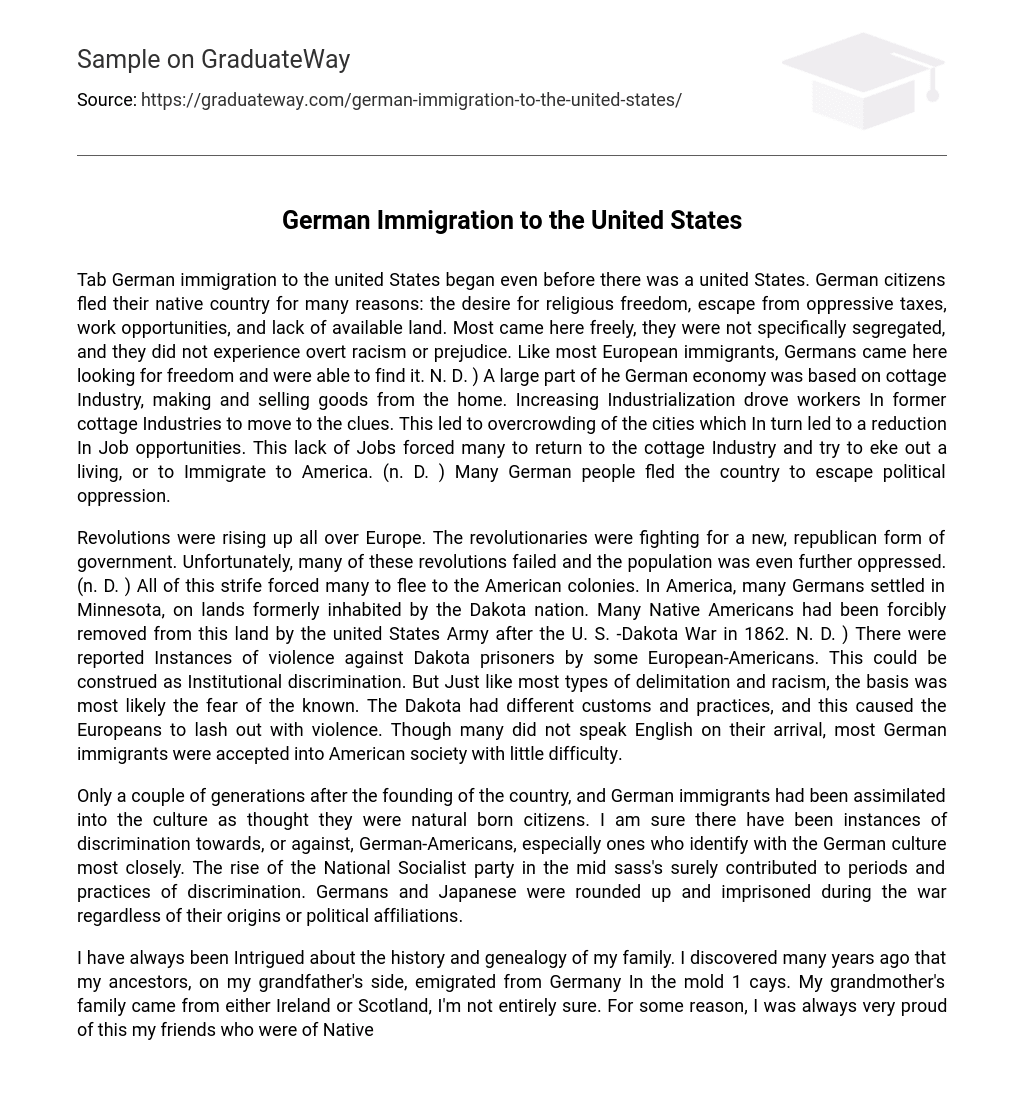Tab German immigration to the united States began even before there was a united States. German citizens fled their native country for many reasons: the desire for religious freedom, escape from oppressive taxes, work opportunities, and lack of available land. Most came here freely, they were not specifically segregated, and they did not experience overt racism or prejudice. Like most European immigrants, Germans came here looking for freedom and were able to find it. N. D. ) A large part of he German economy was based on cottage Industry, making and selling goods from the home. Increasing Industrialization drove workers In former cottage Industries to move to the clues. This led to overcrowding of the cities which In turn led to a reduction In Job opportunities. This lack of Jobs forced many to return to the cottage Industry and try to eke out a living, or to Immigrate to America. (n. D. ) Many German people fled the country to escape political oppression.
Revolutions were rising up all over Europe. The revolutionaries were fighting for a new, republican form of government. Unfortunately, many of these revolutions failed and the population was even further oppressed. (n. D. ) All of this strife forced many to flee to the American colonies. In America, many Germans settled in Minnesota, on lands formerly inhabited by the Dakota nation. Many Native Americans had been forcibly removed from this land by the united States Army after the U. S. -Dakota War in 1862. N. D. ) There were reported Instances of violence against Dakota prisoners by some European-Americans. This could be construed as Institutional discrimination. But Just like most types of delimitation and racism, the basis was most likely the fear of the known. The Dakota had different customs and practices, and this caused the Europeans to lash out with violence. Though many did not speak English on their arrival, most German immigrants were accepted into American society with little difficulty.
Only a couple of generations after the founding of the country, and German immigrants had been assimilated into the culture as thought they were natural born citizens. I am sure there have been instances of discrimination towards, or against, German-Americans, especially ones who identify with the German culture most closely. The rise of the National Socialist party in the mid sass’s surely contributed to periods and practices of discrimination. Germans and Japanese were rounded up and imprisoned during the war regardless of their origins or political affiliations.
I have always been Intrigued about the history and genealogy of my family. I discovered many years ago that my ancestors, on my grandfather’s side, emigrated from Germany In the mold 1 cays. My grandmother’s family came from either Ireland or Scotland, I’m not entirely sure. For some reason, I was always very proud of this my friends who were of Native American or Hispanic heritage. There was never any discrimination or prejudice because of this. I wonder sometimes if others felt the same as I did about their ancestry.
I have always, and will continue to, identify myself as an American. I understand the desire for some people to hyphenate themselves to identify their racial or ethnic heritage. However, I do not agree with that desire. Theodore Roosevelt said “We can have no “50-50″ allegiance in this country. Either a man is an American and nothing else, or he is not an American at all. ” I believe adding a hyphen with another nationality designator, before identifying yourself as n American is akin to treason.
I see no need to identify myself as a German- American, mostly since I was born in the United States. I did live in Germany for three years while in the Air Force, and would go back in a heartbeat. The country is beautiful, if a bit austere. The people are genuinely nice, if you can understand one another. I love the food, and the beer isn’t bad either. But, I will never be anything but an American. I would not want to live anywhere else. References (n. D. ). German Immigration . Retrieved from https://www. Minus. Du/museum/history/ mistranslations/German_migration. HTML





